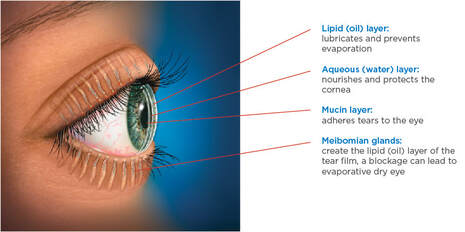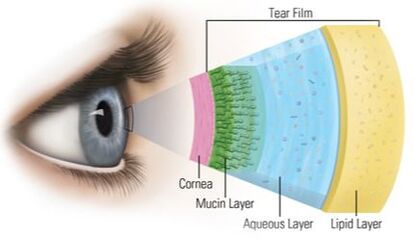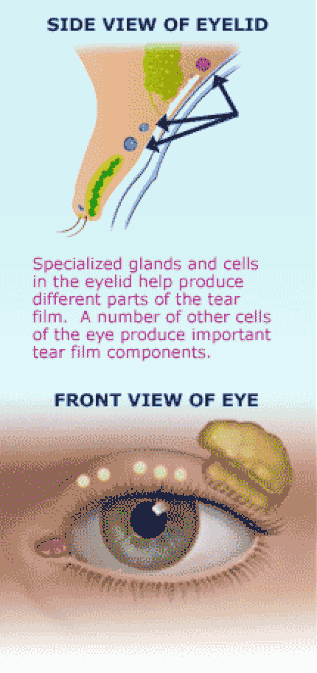|
Tears help your eyes to stay moist, healthy and comfortable. Ocular Surface Disease (or Dry Eye Syndrome) is an eye condition that affects the quantity and quality of tears, causing your eyes to feel dry and irritated. Some people also experience "watery eyes". Tears are composed of three main layers that work together to keep your eyes comfortable and protected. If anything affects the balance of these elements, your tears will dissipate too quickly, causing uncomfortable dry spots.
Every time you blink, a thin layer of tears is spread across the cornea. This layer of moisture, or tear film, forms a protective coat, lubricating your eyes and washing away any foreign bodies that might cause harm or obscure your vision. Even if all the components of your tears are normal, dry spots can still appear on your eyes in certain situations. The corneal cells on the eye's surface have very delicate structures that allow the tears to "stick" to the eye. If these structures are damaged, tear film can break up too quickly.
You might not be able to tell that you have damaged corneal cells, but if your eyes feel dry, or you have a burning sensation often described as "gritty eyes," you may need treatment. Using a corneal staining method (a diagnostic fluorescent stain) and a slit lamp (a special lamp used to see these stains up close), we are able to determine if you have surface damage. Every patient's dry eye symptoms are unique, our doctor's can perform a comprehensive dry eye evaluation and customized treatment plan.
|
Some common causes of dry eye include:
-Environmental, occupational, and lifestyle factors
-Contact lens wear
-Certain types of medications
-Allergies, smoke, and dust
-Prolonged computer use
-LASIK and other refractive surgeries
-Hormonal changes, including menopause
-Aging and loose or sagging lids
-Autoimmune diseases, including Sjogren's Syndrome, Rheumatoid Arthritis, and Lupus
-Reduced blinking
-Contact lens wear
-Certain types of medications
-Allergies, smoke, and dust
-Prolonged computer use
-LASIK and other refractive surgeries
-Hormonal changes, including menopause
-Aging and loose or sagging lids
-Autoimmune diseases, including Sjogren's Syndrome, Rheumatoid Arthritis, and Lupus
-Reduced blinking
If you are experiencing frequent symptoms that are not improved with the use of lubricating drops, schedule a consultation to evaluate your symptoms and customize a treatment plan.


